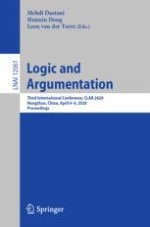This book constitutes the refereed proceedings of the Third International Conference on Logic and Argumentation, CLAR 2020, held in Hangzhou, China, in April 2020. The 14 full and 7 short papers presented were carefully reviewed and selected from 31 submissions. The papers cover the focus of the CLAR series, including formal models of argumentation, logics for decision making and uncertainreasoning, formal models of evidence, con rmation, and justi cation, logics forgroup cognition and social network, reasoning about norms, formal representationsof natural language and legal texts, as well as applications of argumentationon climate engineering.
